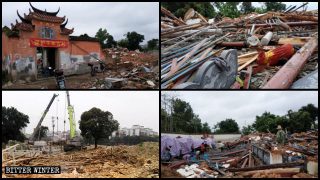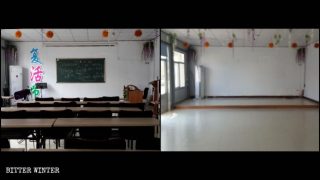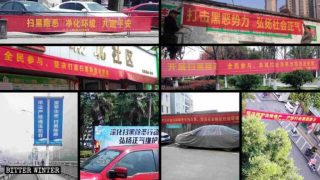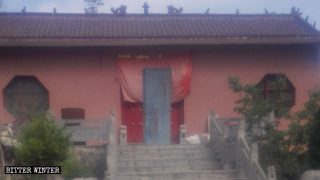Many businesses have been forced to change their names, eliminating any references to faith, even if the signs were not meant to be religious at all.
Li Guang
The Rules for the Prohibited and Restricted Use of Enterprise Names, promulgated by the State Administration for Industry and Commerce in August 2017, stipulates that names of businesses must not contain the names of religious organizations or have religious overtones.
Under the requirements of this policy, Henan, Heilongjiang, Shaanxi, and other provinces have launched a crackdown on shop signboards: Any that contain words or symbols related to Christianity, Buddhism, Islam, or other religions have been ordered to be altered or removed. According to a government insider, the authorities are planning to remove all religious elements on signboards by 2020.
In April, a county in the central province of Henan issued a document ordering to modify the names of enterprises or individual industrial and commercial businesses that contain religious words, such as Islam, Bible, Saint Mary, Immanuel, Bodhisattva, Muhammad, Muslim, etc.
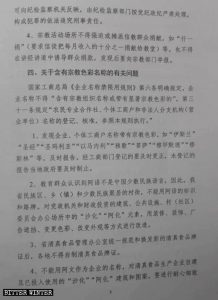
According to a local shop owner, all signboards with religious overtones, including words and phrases have been ordered to be changed. Anyone who doesn’t comply will be subjected to a fine, and their business license will be revoked.
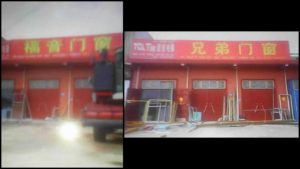
In mid-April, while inspecting a shop named Méng’ēn Fúshì (蒙恩服飾; Méng’ēn means “receiving the grace from God,” and Fúshì means “apparel”), officials berated the shop owner: “You’ve received the grace from God, but you haven’t received the grace from Xi Jinping?” The shop owner was forced to change the store’s name.
A neighborhood in Xigong district of Luoyang city in Henan was initially called Yē-cì Chéng (耶賜城; literally “Jesus-bestowed City”). Since Yē-cì contains the implied meaning “bestowed by Jesus,” the authorities ordered the name to be changed into Tiānxī Chéng (天錫城).

Last November, personnel from the Bureau for Industry and Commerce of Luoyang city inspected a shop named Tiāngāng Shāngdiàn (天罡商店; literally “Big Dipper Store”) and ordered the owner to change the name to Tiān-háng Shāngdiàn (天航商店; literally “Sky-Sailing Store” or “Heavenly-Sailing Store”) because tiāngāng is also a Taoist term, meaning “gods of the stars of the Big Dipper.” According to another anonymous merchant, the reason that the owner chose the shop’s original name was because her son’s name is Tiangang.
In January, Hóng’ēn Guójì Yòujiào Zhōngxīn (鴻恩國際幼教中心; literally “Great Grace Early Childhood International Education Center”), located in Longmen town, under the jurisdiction of Luoyang’s Luolong district, was forced to change its name to Qǐ-Diǎn Míngxīng Yòu’éryuán (啟點明星幼稚園; literally “Starting-Point Celebrity Kindergarten”). The authorities felt that the word hóng’ēn (鴻恩; meaning “great grace”) might make people think of the grace from God.
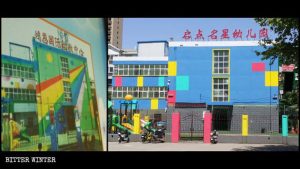
Similarly, Yīdiàn Yòu’éryuán (伊甸幼稚園; literally “Eden Kindergarten”), also located in Luolong district, was forced to change its name to Lántiān Yǔ Yòu’éryuán (藍天雨幼稚園; literally “Blue Sky Rain Kindergarten.”
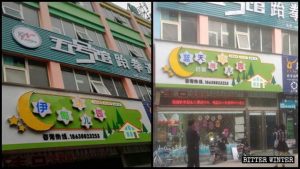
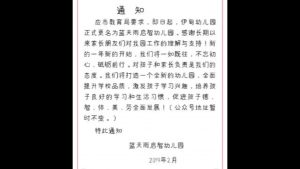
Luoyang city’s Shàngdì Měishíchéng (上帝美食城; literally “God Gourmet Food City”) was renamed Shàngdì Měishíchéng (尚帝美食城; meaning “Shang Emperor Gourmet Food City”).
The document from Henan also states that Arabic is not an ethnic minority language in China, and that street names and signs cannot be in Arabic or include Islam-related elements: All buildings, public facilities, and village (or community) committee offices that the government has invested in must be altered through renovation, redecoration, changes of color and appearance.
The Islamic-style architecture of Jilin city’s Beiji Halal Food Street, in the northeastern province of Jilin, which cost 100 million RMB (about $ 14.5 million) to build, was forcibly demolished, demonstrating the authorities’ determination to destroy all religious elements no matter the cost.
In mid-October last year, personnel from the Ethnic and Religious Affairs Committee of Henan’s Zhengzhou city’s Erqi district and the local sub-district office came to a mosque where they discovered a vehicle with Islamic patterns and symbols that was being prepared for a funeral. The officials sprayed over the Chinese characters hánghǎi Qīngzhēnsì (航海清真寺; literally “the Sailing Mosque”) and some Islamic symbols on the vehicle.

“It’s like the Cultural Revolution now. The CCP won’t even let go of a single character related to religious belief: it hates religion, fearing that the increase in the number of people who believe in God will affect its regime,” said a local Christian preacher. “Xi Jinping is cracking down on all religions because he wants everyone to believe in him, just like Mao Zedong made people shout ‘Long live Chairman Mao.’”
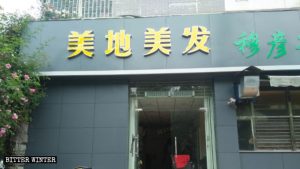
source:BITTER WINTER/Li Guang
